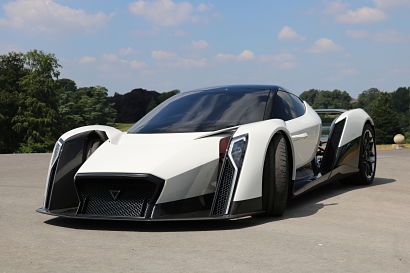
The Dendrobium D-1 was initially conceived by the Singapore-based battery technology company Vanda Electrics, but the Southeast Asian island has no history or expertise in vehicle manufacture and so the electric transportation design specialists turned to the UK for its renowned know-how and prowess to fully develop and engineer the all-electric D-1 hypercar, initially with the support and proven capabilities of the celebrated Formula 1 company Williams Advance Engineering.
Following its recent show-stealing UK debut at Salon Privé within the stunning surroundings of Blenheim Palace, the now fully-British Dendrobium Automotive is looking to manufacture its all-electric D-1 in the UK, despite the current challenges and uncertainties around Brexit.
Despite these Brexit concerns, Dendrobium Automotive’s aim is to manufacture its technically advanced electric D-1 in the UK and keep the technology development intellectual property and supply chain in Britain to help sustain and create new jobs and opportunities.
The distinctive D-1 reflects Dendrobium’s focus on having technology embodied in a ‘sculptured’ car body. It has a target weight of just 1,750kgs with superlight and super strong advance composites and alloys and is intended to deliver impressive performance, rewriting the rules for hypercars, according to the company.
The lightweight construction of the D-1 is based on a unique Protocell carbon tub which has been skilfully engineered with future adaptability for further generations of Dendrobium e-performance cars. In addition to its advanced vehicle technology, the D-1 has a unique Bio-Aerial Locomotion door and roof opening system, inspired by the Dendrobium orchid plant which unfurls naturally in a similar manner, from which the new British hypercar company takes its name.
“I am just back from meetings in mainland Europe and Brexit is unquestionably causing real issues in investment in the UK” said Chairman and CEO of Dendrobium Automotive, Nigel Gordon-Stewart, commenting on the Dyson announcement. “Both British and overseas investors are shying away from committing to technology developments in the UK, mainly because of the uncertainty of the financial and commercial landscape. Despite the current Brexit difficulties, however, Dendrobium Automotive is committed to manufacture in Britain. The British Government continues to do its best providing Research and Development tax credits and various grants specifically for EV and PHEV UK technology and product development operations. In my opinion, Dyson’s planned manufacture in Singapore, seems very wrong. And the current ‘brain drain’ by EV development companies in the USA and Far East is also a huge concern as our focus seems to be more on a Brexit blame culture rather than keeping our sight firmly fixed on the future and investing in that future. British Engineering is, without doubt, the best in the world, and needs to be focused here in the UK to enable dominance in the biggest and most dramatic change in personal mobility in over 100 years.”
Gordon-Stewart added that the electric and hybrid car shift is the greatest revolution and evolution in the £100 billion automotive industry for over 100 years and timing is critical for ensuring British engineering remains best in the world to benefit Britain. Dendrobium is designing its own in-house all-electric power train and plans to use its own power storage cells, moving to solid state as and when the technology is reliable and financially viable, with its own unique cabling and connector system, developed in-house in the UK as well as its own complete vehicle integration and ADAS hardware and software. From a technical perspective, the D-1 will be a British engineering tour-de-force, designed and built in Britain.
For additional information:

